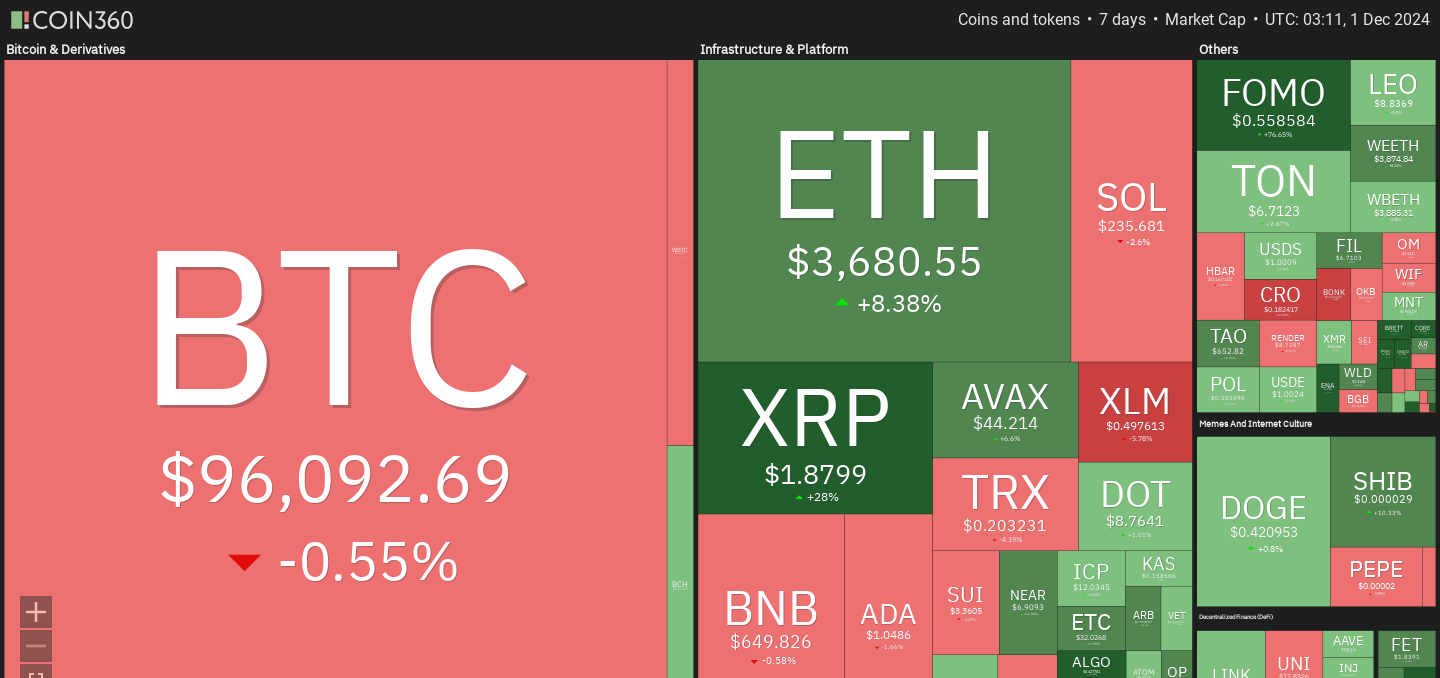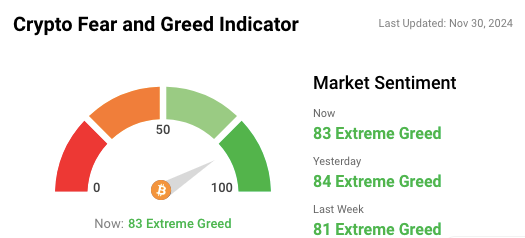📔 Weekly Journal: AI Outperforms Doctors in Diagnosis
[6 min read] Your weekend guide to getting ahead on the digital frontier. Today, the usual market news & the studies where ChatGPT surpassed scientists and GPs in performance.
Welcome to this week’s Weekly Journal 📔, your guide to the latest news & innovation in emerging technology, digital assets, and our exciting path to the Metaverse. This is week 104 of the 520 weeks of newsletters I have committed to, a decade of documenting our physical and digital lives converge.
New subscribers are encouraged to check out the history & purpose of this newsletter as well as the archive.
- Ryan
🌐 Digital Assets Market Update
To me, the Metaverse is the convergence of physical & virtual lives. As we work, play and socialise in virtual worlds, we need virtual currencies & assets. These have now reached mainstream finance as a defined asset class:
🔥🗺️ 7-day heatmap below, showing the current share of the market for the top cryptocurrencies, and their change in price over the last week. BTC knocking on $100k!
🎭 Crypto Fear and Greed Index is based on volatility, social media sentiments, surveys, market momentum, and a few other bits and pieces.
🗞️ Interesting news from this week
The metaverse tokens sector is experiencing a strong resurgence, with key cryptocurrencies The Sandbox (SAND) and Decentraland (MANA) leading the charge. SAND has surged by 130% in a week, signaling a breakout from a long-term downtrend, while MANA has followed closely, climbing 85%. This rally comes despite a broader market dip driven by Bitcoin's retreat. The resurgence is seen as a positive shift for the metaverse, a space largely overlooked in 2024, with the sector’s overall market capitalization rising by 14% to $14.52 billion. SAND’s breakout, fueled by a bounce off crucial support levels, has reignited buyer confidence, while MANA’s performance has been bolstered by SAND’s gains. Analysts are closely watching for consolidation before a potential further upward move, as both coins show signs of overbought conditions. This recovery highlights the growing interest in virtual worlds and their associated assets within the expanding metaverse.
Rasasi Perfumes Introduces Virtual Oud Experience in the Metaverse. Dubai-based Rasasi Perfumes, a leader in luxury oriental fragrances, has entered the metaverse with a pioneering initiative that blends the ancient essence of oud with cutting-edge digital innovation. In partnership with Gamitronics and powered by the PartyNite metaverse, Rasasi has launched the Agarwood Metaverse—a multisensory, immersive experience that redefines how fragrance is experienced in the digital age. Visitors to the Theatre of Digital Art (TODA) in Dubai were introduced to a virtual forest filled with towering Aquilaria trees, emanating the rare aroma of oud. Through scent simulation and interactive landscapes, Rasasi offers a unique journey into the mystique of Agarwood, merging heritage with futuristic technology. This initiative targets tech-savvy Gen Z and Millennials, elevating the luxury fragrance experience while celebrating a cultural icon in a virtual world. The Agarwood Metaverse is accessible via the Partynite app and Rasasi’s website.
Canadian News Outlets Sue OpenAI Over Copyright Allegations. In a landmark legal action, a coalition of major Canadian news organizations, including the Toronto Star, CBC, and The Globe and Mail, has filed a lawsuit against OpenAI, accusing the company of unlawfully using their articles to train its AI models, like ChatGPT. The plaintiffs argue that OpenAI's use of copyrighted content without permission breaches copyright laws and undermines journalism's public value. OpenAI, in defense, maintains that its models are trained on publicly available data and that it operates within fair use principles, offering ways for publishers to opt out. The media group seeks C$20,000 in damages per article used, which could result in billions of dollars in compensation, alongside a court order for OpenAI to share profits derived from their content. This lawsuit follows similar actions in the U.S., highlighting the growing tension between traditional media and AI companies in the rapidly evolving metaverse and digital economy.
👓 Read of the Week
This Week’s Read of the Week is: Why Crypto Matters in Developed Economies. While crypto is often viewed as a tool to bank the unbanked in developing countries, its significance is growing in the Global North as well. In developed economies, adoption is driven by factors like institutional distrust, underbanked populations, and the rise of digital-native economies. Even though financial systems in places like the U.S., Canada, and Europe appear stable, recent events such as the collapse of major banks have sparked growing doubts about their reliability. This erosion of trust is particularly felt among marginalized groups, with nearly 20% of Black Americans owning cryptocurrency as a means to achieve financial independence and wealth-building. Furthermore, the underbanked population, which comprises around 6% of the U.S. population, is increasingly turning to crypto for secure, decentralised financial solutions. Younger generations, who are already familiar with virtual currencies through gaming and digital economies, are also embracing crypto for its seamless interoperability and innovative features that traditional finance struggles to offer. For me the takeaway message was that in developed economies, crypto adoption is not about necessity but choice, offering an alternative to traditional financial systems and paving the way for a more globalised, tech-driven future. Great read!
🎥 Watch of the week
Watch of the Week: “The Future of AI in Medicine:. While AI may seem daunting to many, its potential to transform medical care is immense. From streamlining the process of collecting patient data to predicting conditions like Parkinson’s disease, AI promises to significantly improve efficiency and outcomes in healthcare. However, its integration comes with risks that must be carefully managed. Dr. Conor Judge, a consultant nephrologist at Galway University Hospital and senior lecturer at University of Galway, sheds light on the necessary steps for safely implementing multimodal AI into healthcare systems. With a background in both electronic and computer engineering, and a PhD from the Health Research Board Clinical Research Facility Galway, Conor combines his expertise in data analytics and medicine to push the boundaries of medical technology. He also recently developed the MSc in Applied Clinical Data Analytics, further bridging the gap between technology and healthcare.
AI 🎨🤖🎵✍🏼
In the Metaverse, AI will be critical for creating intelligent virtual environments and avatars that can understand and respond to users with human-like cognition and natural interactions:
As AI rapidly advances, its implications for the future of work, especially in professions like healthcare, are increasingly concerning. Studies showing AI's ability to outperform doctors in diagnostic tasks raise fundamental questions: If an AI can provide a better diagnosis than a human doctor, what is the future role of medics?
Drew Breunig, an anthropologist, categorizes AI into three types: "gods," "interns," and "cogs." Today, AI primarily functions as "interns"—supervised tools that assist professionals in tasks such as data processing, idea generation, and documentation. These AI systems, like ChatGPT, are designed to collaborate with experts, but as demonstrated in a recent study, they may outperform human professionals. In the study, ChatGPT’s diagnostic performance exceeded that of physicians, revealing a critical issue: many doctors failed to utilize the AI effectively or even resisted its suggestions, highlighting the challenge of integrating AI into decision-making processes.
AI's involvement in research has yielded similar results. In material science, AI contributed significantly to idea generation, leading to a 39% increase in patent filings. However, the researchers, who were relegated to more mundane tasks, reported a drop in job satisfaction, underscoring the psychological impact of AI partnerships.
These developments suggest a future where AI not only augments human work but may fundamentally alter professions, including medicine. As we move into the metaverse and beyond, understanding AI's role and adapting to this new reality will be critical for professionals and industries alike.
That’s all for the free version this week! If you have any organisations in mind that could benefit from learning about emerging technology, be sure to reach out. Educational workshops are one of many consulting services I offer.
DCA With Me 🤑
Dollar Cost Averaging is an investment strategy in which an investor regularly invests a fixed amount of money into a particular asset/asset class at regular intervals, regardless of its current market cycle. By doing so, the investor can reduce the impact of market volatility and potentially earn a better return over time. Motto = time IN the market beats trying to time the market
To experiment with this, I invest $50 NZD into a Digital Asset every week. Each week I will choose an asset that seems underpriced in the short term and has positive long-term potential. My timeframe is 3-5 years. I don’t give financial advice but if you want to follow along with me you can use my easycrypto.co.nz referral link to support this newsletter. Let’s dive into this week’s pick:
Keep reading with a 7-day free trial
Subscribe to Metaverse Field Guide to keep reading this post and get 7 days of free access to the full post archives.



